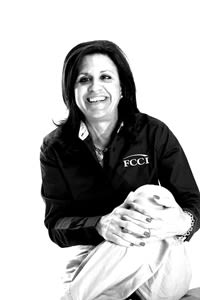Great Ideas!
How to Speak in Public

Positively Speaking
Linda Larsen launched her motivational speaking career in 1995. Since then she’s spoken at 1,000 events in the U.S. and abroad, in front of audiences as large as 17,000.
“The No. 1 thing is to write a great speech. First ask, ‘What’s the purpose of my speech? Is it to convince, motivate, enlighten? What do I intend to have happen? Is my audience supposed to take action? How do I want people to feel after they have heard me?’ You can’t write a good speech without knowing that. The second step is equally important. Practice the sucker at least 25 times up on your feet. Saying it once in front of a mirror isn’t good enough. Do it over and over until you don’t have to think. It’s called unconscious competence. And when you get up to speak, become other-focused. Be the watcher and not the watched.”
How to Write a Press Release

Heidi Smith Communications
Heidi Smith has been a communications professional since 1995, with marketing expertise in fields from economic development to taking companies public.
“If you want your news release to be noticed, think like an editor, who has mere seconds to decide whether to read on. Get to the point: Why should I or my readers care? Is the essential information here, or do I have to hunt for it? Is the call to action for readers clear? Keep it brief, usually one page. Avoid industry jargon and marketing puffery. Send the release embedded in the email message, not as an attachment. The email subject line should be the release headline. Above all, answer the question, ‘Who cares?’ If only your organization gives a hoot, it’s not news—it’s just an item for internal atta-boys, not the media.”
How to Hire

The Ritz-Carlton, Sarasota
Paula Purcell is the director of human resources at the local Ritz-Carlton.
“Understanding the mission and vision of your department or company is the most important thing to know before you interview or hire. What does your company stand for? What are your values? We use a structured interview guide, which is good because I have a glimmer of hope for every applicant. We’re looking for the applicant’s past behaviors because ultimately that will predict their future behaviors. It’s all based on competencies. I’m looking for the action the applicant took and the result. Any question we ask is always open-ended because it keeps the applicant talking. Never use leading questions to get the answer you want, or theoretical questions, like, ‘What would you do?’ since everyone has a [good] answer in hindsight. The interview is just part of our process. It doesn’t stop once they’re hired. We have a three-day orientation for our employees, and every day we talk about who we are as a company. That’s so critical to our success.”
How to Negotiate a Lease

LWR Commercial Realty
Brian Kennelly heads up LWR Commercial Realty, a subsidiary of Schroeder-Manatee Ranch, and chairs the Real Estate Oversight Committee of the Sarasota Economic Development Corporation.
“Every company has a life cycle. If you’re growing, negotiate first right of refusal for contiguous space. If you think you may downsize, is there an exit strategy to give back space? Make sure the landlord has the capability and financial ability to fulfill his obligations, such as maintaining the roof and the property. You don’t want the bank or the FDIC as your landlord. Make sure you understand your pass-through expenses—common areas, real estate taxes, insurance. Will you pay electricity? Phone? Water? Parking? How many spaces will you get? You have to determine all of your expenses to make a decision. In this market, vacancies are substantial, and it’s competitive for quality credit-worthy tenants.”
How to Balance Work and Life

The Met Fashion House, Day Spa and Salon
Brenda Michel has co-owned The Met with husband Geoffrey Michel since 2000. The Michels have been married 16 years and have two children.
“I start every day with a list of priorities so I know the two or three things I have to get done, and I finish those first. I know my limitations and don’t try to do more. I also don’t over-schedule anymore. Having children, career or not, is a challenge; I have to spend individual time with both my children to make it work. I make sure I can spend a good amount of time with my kids, my husband and friends. My husband and I work all day together, and we still have lunch and dinner together every day; he’s my best friend. I don’t do all of the things I’d like to do, like exercising, but it’s a give and take.”
How to Design a Home Office

Living Walls Furniture and Design
Alison Bishop is the owner, designer and buyer at Sarasota’s Living Walls, which sells modern furniture and offers interior design assistance.
“You’re creating a workspace. It’s got to help you be efficient and make you feel good about yourself. Arrange your desk so that you are not facing a wall. Most people prefer to look at the room or out a window, even if the window is to your side. If you’re a paper piler, you need a lot of surface area. If you are very organized, you need storage space. And if you don’t need a file more than once a year, it shouldn’t be in your work area. Pay attention to comfort, and make sure the finishes on your furniture are durable, not delicate. Glass-top desks function well; they are hard, they clean easily, and they even look a little bit glamorous.”
How to Find Capital

BizTank LLC
A Sarasota-based serial entrepreneur, Dan Miller is the managing partner at BizTank, LLC, the chief revenue officer at MobileBits and a board member at Pongo Software.
“Bank financing is not a viable option for most early-stage companies. One approach is to pitch friends and family, but the risk is, if the investment doesn’t return, it will most likely negatively affect the relationship. A better and perhaps more efficient route is to identify active angel investors who along with money may bring other critical benefits such as business-building insights, customer connections or a network of other investors. Start with connecting through the Angel Capital Association and/or leverage incubation/acceleration firms such as Abbeton Accelerator, Y-Combinator and TechStars. Gust and AngelList provide access to investors looking to match up with early-stage investment opportunities.”
How to Approach A Lawsuit

Bentley & Bruning, P.A.
A partner in the law firm Bentley & Bruning, Morgan Bentley concentrates on litigation of business and real estate disputes.
“A lawsuit is extremely intrusive. Every request for a deposition or a record falls on your shoulders. If you’re GE or Ford, you have 50 lawyers. Small businesspeople have to do it all themselves, and that’s time and money out of every day. As mad as you may be, the process takes months and even years to work out. The person who stays the course, knows his strategy and works the hardest, wins the race. I’d like to say it’s brilliant lawyering, but it’s really that vanilla. The American trial system is the best in the world. But it’s also the last thing you should use. I always tell people, a bad settlement is better than a good lawsuit.”
How to Excel At Customer Service

former executive vice president of Applebee’s International
Sarasota resident Skip Sack, the former executive vice president of Applebee’s International, sits on the board of the National Restaurant Association.
“Customer service is doing something no one else does, something that surprises the customer and sets one business apart from another. [For example], if a person leaves an American Express card in a business, overnight it and send a gift card. If you have a customer service desk, the last thing you want to do is antagonize your customer by having them wait 10-15 minutes. Your customer service desk is an opportunity to recover from a bad situation. If you’re setting up an office, make sure your people are smiling and friendly. So many people relegate customer service to the backroom, but it matters. If you take care of the customer, they’ll tell four people. If they have a problem, they’ll tell 10 people.”
How to Approach an IRS Audit

CS&L, CPAs
Aubrey Lynch is a tax principal with CS&L, CPAs and specializes in IRS audits as well as international tax, estates and trusts, and the healthcare industry.
“I’ve seen an increase in IRS audits the last few years, and the bulk are random. A large transaction makes it more likely you will be audited [as will] any foreign transaction or investment. If the IRS does come knocking, have a CPA with experience in similar businesses to yours represent you. Don’t ignore the letter from the IRS. Respond in a timely manner. My experience is it’s better to work in collaboration with them. They’ll often make reasonable concessions. Keep your books and records in an appropriate fashion. Financial records must be kept for seven years; reconcile your bank statements monthly; and make sure you are capitalizing fixed assets instead of expensing them. Small businesspeople often do their own bookkeeping, and that’s OK, but they could still have a CPA or bookkeeper go over their books on a quarterly or annual basis.”
How To Choose the Right Technology
Kevin Baylor,

Kevin Baylor is one of threefounding managing partners of IT company Suncoast Business Technologies in Sarasota.
“No matter what the market or industry, figure out what you need. Do you just need Internet action and a point of sale system and then you’re done? Or do you have a sales team, which needs iPads and a billing system? A small retail shop will be different from a 30-person construction firm. Talk about it with a professional upfront before you invest.
“Budget definitely plays into it. There is an industry standard—3 percent to 5 percent of your budget should be going toward IT. Don’t overdo it. You can always add, especially if you’re a start-up. You don’t want to buy a $1,000 solution for a $50 problem. Do your research if you’re letting someone into your business. Check with chambers and get references from people who are using those companies.”

atLarge Inc.
Anand Pallegar is president and founder of atLarge, Inc., a Sarasota-based digital marketing agency, which develops online strategies for clients around the country.
“I’m amazed at how many organizations dive in without clearly defined objectives, simply in the name of following competitors. Are you trying to build a brand, gain relationships, streamline customer support? Focus on one of these to start. Deliver consistent, quality content to your followers. Your content, ideas and tone should follow the objective you’ve outlined. Social media is an amazing channel to track competitors, industry thought leaders and business peers. It will open you to insights and perspective beyond your physical reach. It gives you the greatest platform to present a personable brand while establishing trust and rapport among a customer base. Most importantly, think before you post. Trying to remove something from the Internet is akin to trying to take pee out of a swimming pool. Don’t ever forget that!”
How to Run a Meeting

Lewis, Longman & Walker, P.A.
Chip Rice is a senior attorney at Lewis, Longman & Walker, P.A., was the county attorney for Manatee County for 12 years and has chaired many boards.
“I say, ‘This meeting will start at 8 a.m. and end at 9 a.m.’ I don’t care if someone is in mid-sentence. I set the time limit and always have a written agenda. A meeting that’s more than one hour is too long. I give people three minutes each to comment. After that I will cut them off. It’s a matter of corporate discipline. I have to manage the meeting for the majority of folks and can’t let people wander off [in their comments.] I say, ‘Your time is up, but if you have more questions, talk to me or any member of the committee after the meeting.’ Most people tell me they’re grateful they can get their business done and get on with the rest of their day.”
How to Go Global

Sun Hydraulics
Allen Carlson has been the CEO of Sun Hydraulics for 13 years. The company has factories in China, Korea, Germany, India, France and England, and distributors around the world.
“If international penetration is part of your growth strategy, think about it like going to Las Vegas. Put some money aside—say $50,000—and be prepared to lose it. You should have done some research on the best geographical markets. Pick only one and see what your results are. Be prepared to go back several times and have a three- to five-year time line. And as the owner or manager, you must be directly involved. You also have to have somebody there, a distributor or dealer. Be prepared to seed the market with samples. Provide customers with an opportunity to try your product. You don’t have to speak any other language. In fact, it’s better that you don’t. You want to deal with companies that have English speakers since they’re most prepared to do international business. You should know about cultural differences, though. You can embarrass yourself and others by not understanding what’s acceptable. Buy a book on business culture for a particular country and learn 20 expressions. I usually know ‘hello,’ ‘thank you,’ ‘no problem,’ ‘big problem,’ and ‘I don’t care’ when they ask me where I want to go for lunch.”
How to Fire

FCCI Insurance Group
Lisa Krouse is senior vice president of human resources and support services at FCCI, a commercial property and casualty insurance company. An attorney, she writes about employment law and recently co-authored Inside the Minds: HR Leadership Strategies.
“Research indicates that losing a job is one of the most difficult situations a person will [ever] face. Given that, don’t do it by phone, don’t send a text message, don’t do it by email, don’t do it on Facebook or Twitter, and for goodness’ sake, let’s not deliver the message on someone’s birthday or other important day. When you are delivering the message, be clear. Plan the event. Plan what you will say. Keep the message brief. Keep your feelings to yourself. Don’t argue. Don’t review history. Give time for the person to collect themselves, and develop a plan to inform other affected employees about the changes that occurred in a timely and considerate way.”